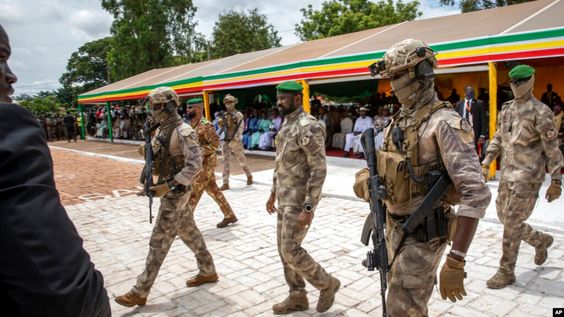Africa
All 49 Ivorian soldiers were pardoned by the Mali Junta leader

A week after the courts sentenced the 49 Ivorian troops, Mali’s junta leader on Friday pardoned them all, according to a government official. Their detention in July caused a tense diplomatic standoff.
According to a statement from the government’s spokesperson, Colonel Abdoulaye Maiga, the minister for territory administration and decentralisation, “Colonel Assimi Goita… awarded a pardon with full remission of penalties to the 49 Ivorians convicted by the Malian court system.”
The original 49 soldiers, who had already been released in early September, received death penalties in absentia on December 30, while 46 soldiers received 20-year prison sentences.
They were found guilty of attempting to compromise state security as well as a “attack and conspiracy against the government,” according to a statement made at the time by public prosecutor Ladji Sara.
The trial began on December 29 in Bamako, the nation’s capital, and ended the following day.
The court proceedings took place just before the Economic Community of West African States (ECOWAS) leaders’ Sunday deadline for Mali to free the soldiers or face sanctions.
The troops, who were captured after arriving at Bamako airport on July 10, were identified as mercenaries by Mali’s junta.
The soldiers were reportedly brought in, according to Ivory Coast and the United Nations, to provide routine backup protection for the German contingent of the U.N. peacekeeping mission in Mali.
Escalation
Before the arrests, tensions between ECOWAS and Mali already existed due to the overthrow of President Ibrahim Boubar Keita in August 2020 by officers frustrated by their inability to quell a terrorist insurgency.
Alassane Ouattara, the president of the Ivory Coast, is regarded as one of the most unyielding figures in West Africa toward the putschists in Mali.
The junta has so far defied criticism and sanctions from West Africa and held onto power, promising to leave in February 2024.
It charged the 49 troops in the middle of August but has since given no updates on their condition.
A joint statement from the foreign ministries of Togo and Ivory Coast in July quoted Junta leader Goita as saying he was open to discussions “in the utmost respect of Mali’s sovereignty.”
In a letter to the Malian government after the troops were detained, the U.N. acknowledged some procedural “dysfunctions” and accepted that “some measures have not been implemented.”
Following Mali’s demand for an apology, the Ivorian presidency likewise expressed regret for “shortcomings and misunderstandings” in September.
However, the conflict worsened in September, according to diplomatic sources in the area, when Mali demanded that Ivory Coast accept responsibility and show regret for sending the soldiers.
Additionally, they claimed that Bamako demanded that Ivory Coast turn over residents who have been on its soil since 2013 but who are wanted in Mali.
According to the sources, Ivory Coast rejected both demands and was ready for protracted discussions to secure the men’s release.
At the time, the president of Ivory Coast warned that the hostage-taking would not go without repercussions.
As a result, Maiga, who was acting as temporary prime minister at the time, spoke out against a “synchronisation of acts” against Mali on September 24 before the U.N. General Assembly.
He criticises Antonio Guterres, secretary-general of the United Nations, for saying that the Ivorian soldiers were not mercenaries.
He also had harsh words for the presidents of Ivory Coast and Niger, as well as ECOWAS leader Umaro Sissoco Embalo.
Brotherhood and friendship
Before the trial began, an Ivorian delegation went to Mali to discuss the problem, and the Ivorian defence ministry claimed that it was “on the path to being addressed.”
A deal negotiated between Mali and the Ivory Coast left open the possibility of a presidential pardon by Goita.
According to Maiga’s statement released on Friday, “the measure of pardon taken by the president of the transition thus reinforces the momentum created following the signing… of the Memorandum of Understanding on the promotion of peace and the strengthening of relations of friendship, brotherhood, and good neighbourliness between the Republic of Mali and the Republic of Ivory Coast.”
The Togolese President Faure Gnassingbe, who has been mediating the dispute and paid a “friendly working visit” to Bamako on Wednesday, received praise from the Malian administration for “his relentless efforts and constant commitment to dialogue and peace in the region.”
But it condemned Embalo, the ECOWAS chief, for his “aggressive position.”
